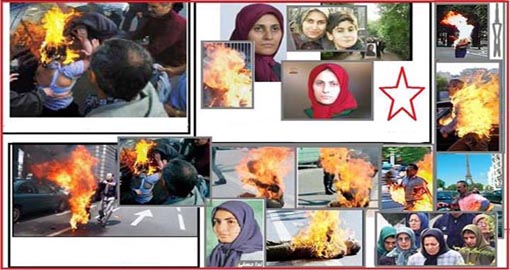“Interestingly it was through Neda Hassani that I met my future husband because she worked in the MEK’s Westminster based PR office where he was also stationed and I was sent to work with her. How ironic it seems now that while Massoud and I were leaving, she was getting more deeply involved. Like ships in the night we passed each other by, unaware of our future destinies. Even at the time I remember trying to talk to her and explain that the MEK are not what she thought they were. But of course, the radicalization process had already begun and she couldn’t heed my warnings.” Ann Singleton, former member of the Mujahedin Khalq Organization (the MKO/ MEK/ the Cult of Rajavi).

The destiny of Neda Hassani was tied to the arrest of the MKO leader Maryam Rajavi by the French Police, on June 17th, 2003. To protest the arrest of the cult leader, a dozen of the group members set themselves on fire in the streets of the European capitals. Neda Hassani was one of those radicalized members of the group who lost her life for the freedom of the cult leader. According to the MKO propaganda, Maryam Rajavi was their “hope for freedom”! Another woman, Sedigheh Mojaveri died because of the self-immolation and several others became paralyzed.
Consequently, Maryam Rajavi was freed but what was the outcome of the incidents of June 2003 for the group and for the world around it?
After the American invasion to Iraq in March 2003 and the collapse of the Iraqi dictator Saddam Hussein, the MKO lost its main military and financial sponsor. The US military first bombed the group’s camps in Iraq and then signed an agreement with it. Following the agreement, the US military disarmed the MKO. Disarmament of the group was actually like confiscating its identity. The MKO’s essence and identity was based on armed struggle and violence. Its tanks, military trucks, weapons and arms were sacred objects in the hands of members.
Disarmament of the MKO and the fall of Saddam Hussein caused an increasing demand for defection from the group. Dissident members could not accept the MKO’s alliance with the US imperialism, formerly known as the main enemy of the Khalq (people). They found it contradictory to stay disarmed in Iraq under the shelter of the US forces. They began questioning the leaders’ strategies and eventually left the group’s cult-like brainwashing system. Since 2003, defectors of the MKO formed a huge wave of revelations about the horrible and abusive system of the MKO.
In addition, the fall of Saddam Hussein frightened the MKO leaders. Maryam Rajavi and a number of high-ranking members of the group fled Iraq to France just a few weeks before the French Police’s raid on their headquarters in Auver sur d’Oise, Paris. Massoud Rajavi in his turn was terrified by the arrest of Maryam and has disappeared since then!
The newly-established Iraqi government, a friend of its neighboring country Iran, and hostile with the MKO for its long-time alliance with Saddam Hussein in the suppression of Iraqi Kurds and Shiites, did not want the cult of Rajavi in its territory. Some years lasted until the Iraqi government succeeded to shut down the MKO’s beloved and glorified base Camp Ashraf. By the aid of the UN authorities, the MKO is gradually relocated in Albania, Europe. Therefore since 2003 the MKO has been on decline.
On the other side, the human torches before the eyes of Europeans citizens clarified the existence of a cult in the heart of Europe. Suicide and Self-immolation is the normal reaction of most of the cults in case that their guru is in danger or if they are ordered by the guru. Self-immolations added a new dark page to the history of the notorious Mujahedin khalq.
Although the MKO propaganda uses the names of Neda Hassani and Sedigheh Mojaveri as martyrs and heroes who sacrificed themselves for their leader, the world sees significant signs of cult-like indoctrination and coercion in the death of two young women. The MKO definitely demoted from a political movement to a destructive cult in the view of the international community –it was previously detested by the Iranians for its terrorist acts and its alliance with Saddam Hussein.
Mazda Parsi

